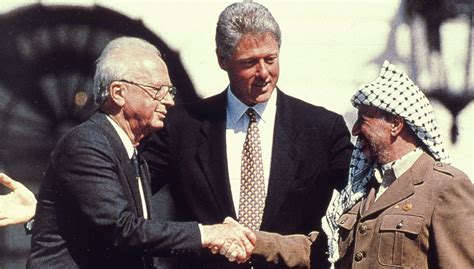
The Oslo Accords, signed in 1993, were intended to lay the groundwork for a peaceful resolution to the Israeli-Palestinian conflict by establishing a framework for negotiations and interim agreements. Despite initial optimism and hopes for a lasting peace, the Oslo Accords ultimately failed to achieve their intended objectives and usher in a comprehensive resolution to the conflict. The failure of the Oslo Accords can be attributed to a combination of factors, including political, structural, and ideological challenges, as well as actions and decisions taken by both Israeli and Palestinian leaders.
1. Lack of Trust: One of the fundamental reasons for the failure of the Oslo Accords was the lack of trust between the Israeli and Palestinian leadership. Decades of conflict, violence, and mutual suspicion had created deep-seated mistrust and animosity between the two sides, making it difficult to build the necessary confidence and goodwill for meaningful negotiations and cooperation.
2. Violations and Setbacks: The Oslo Accords were plagued by violations and setbacks from the outset, undermining confidence in the peace process and fueling skepticism among both Israelis and Palestinians. Palestinian terrorist attacks against Israeli civilians, continued Israeli settlement expansion in the occupied territories, and other unilateral actions by both parties violated the spirit and letter of the Oslo agreements, eroding trust and perpetuating a cycle of violence and retaliation.
3. Political Opposition: The Oslo Accords faced fierce opposition from hardline elements on both the Israeli and Palestinian sides who opposed any compromise or concessions to the other side. Israeli Prime Minister Yitzhak Rabin faced opposition from right-wing political parties, settlers, and extremist groups who rejected the idea of territorial withdrawal and Palestinian statehood. Similarly, Palestinian leader Yasser Arafat faced opposition from militant factions within his own Fatah movement and from rival Palestinian groups who opposed recognition of Israel and advocated for armed resistance.
4. Settlement Expansion: Israeli settlement expansion in the occupied West Bank and Gaza Strip emerged as a major obstacle to the implementation of the Oslo Accords. Despite commitments to freeze settlement construction, Israel continued to expand existing settlements and establish new ones, effectively undermining the territorial contiguity and viability of a future Palestinian state. The expansion of settlements deepened Palestinian resentment and undermined confidence in the prospects for a two-state solution.
5. Security Concerns: Security concerns played a significant role in the failure of the Oslo Accords, as both Israelis and Palestinians grappled with the challenge of addressing terrorism and violence. Israeli concerns about Palestinian terrorism and the threat to Israeli civilians fueled calls for stringent security measures and military responses, while Palestinian grievances about Israeli occupation and repression fueled support for armed resistance and militant groups.
6. Leadership Failures: Both Israeli and Palestinian leaders failed to demonstrate the political will and leadership necessary to make the difficult compromises and concessions required for a lasting peace agreement. Israeli Prime Minister Yitzhak Rabin was assassinated by a right-wing extremist in 1995, dealing a severe blow to the peace process and depriving it of his pragmatic leadership. Palestinian leader Yasser Arafat, meanwhile, proved unwilling or unable to rein in militant factions and control violence, undermining his credibility as a partner for peace.
7. Unresolved Core Issues: The Oslo Accords failed to address many of the core issues at the heart of the Israeli-Palestinian conflict, including the status of Jerusalem, the fate of Palestinian refugees, the borders of a future Palestinian state, and the security arrangements between Israel and Palestine. Attempts to negotiate these contentious issues proved elusive, as both sides remained entrenched in their positions and unwilling to make the necessary compromises for a final settlement.
8. Economic Disparities: Economic disparities between Israelis and Palestinians widened in the aftermath of the Oslo Accords, exacerbating existing inequalities and fueling resentment and frustration among Palestinians. While Israel enjoyed economic growth and prosperity, Palestinians in the occupied territories faced high unemployment, poverty, and limited access to resources and opportunities. The failure to address these economic disparities undermined confidence in the peace process and contributed to a sense of hopelessness and disillusionment among Palestinians.
9. Regional Dynamics: Regional dynamics and geopolitical shifts also played a role in the failure of the Oslo Accords. The outbreak of the Second Intifada in 2000, sparked by a visit by Israeli politician Ariel Sharon to the Temple Mount in Jerusalem, further escalated tensions and violence between Israelis and Palestinians, derailing the peace process and leading to widespread bloodshed and suffering on both sides. The regional context, including the rise of Islamist extremism and the collapse of the Oslo process, further complicated efforts to achieve a comprehensive peace agreement.
10. Legacy and Lessons Learned: The failure of the Oslo Accords underscored the complexity and intractability of the Israeli-Palestinian conflict and the challenges of achieving a durable and just peace. The Oslo experience highlighted the need for sustained international engagement, genuine leadership, and a commitment to addressing the root causes of the conflict, including occupation, settlements, security, and refugees. Despite its failure, the Oslo Accords laid the groundwork for future peace efforts and provided valuable lessons for policymakers, diplomats, and peacemakers seeking to resolve the Israeli-Palestinian conflict through negotiation and dialogue.